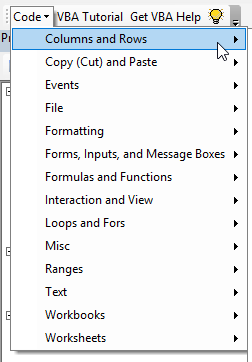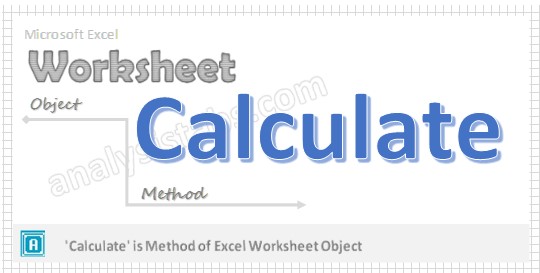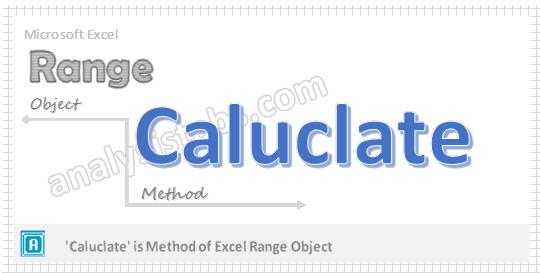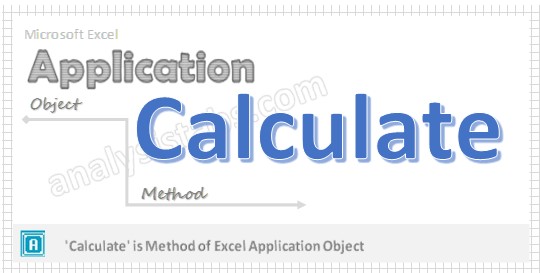Return to VBA Code Examples
In this Article
- Calculate Now
- Calculate Sheet Only
- Calculate Range
- Calculate Individual Formula
- Calculate Workbook
- Calculate Workbook – Methods That Don’t Work
This tutorial will teach you all of the different Calculate options in VBA.
By default Excel calculates all open workbooks every time a workbook change is made. It does this by following a calculation tree where if cell A1 is changed, it updates all cells that rely on cell A1 and so on. However, this can cause your VBA code to run extremely slowly, as every time a cell changes, Excel must re-calculate.
To increase your VBA speed, you will often want to disable automatic calculations at the beginning of your procedures:
Application.Calculation = xlManualand re-enable it at the end:
Application.Calculation = xlAutomaticHowever, what if you want to calculate all (or part) of your workbooks within your procedure? The rest of this tutorial will teach you what to do.
Calculate Now
You can use the Calculate command to re-calculate everything (in all open workbooks):
CalculateThis is usually the best method to use. However, you can also perform more narrow calculations for improved speed.
Calculate Sheet Only
You can also tell VBA to calculate only a specific sheet.
This code will recalculate the active sheet:
ActiveSheet.CalculateThis code will recalculate Sheet1:
Sheets("Sheet1").CalculateCalculate Range
If you require a more narrow calculation, you can tell VBA to calculate only a range of cells:
Sheets("Sheet1").Range("a1:a10").CalculateCalculate Individual Formula
This code will calculate only an individual cell formula:
Range("a1").CalculateCalculate Workbook
There is no VBA option to calculate only an entire workbook. If you need to calculate an entire workbook, the best option is to use the Calculate command:
CalculateThis will calculate all open workbooks. If you’re really concerned about speed, and want to calculate an entire workbook, you might be able to be more selective about which workbooks are open at one time.
Calculate Workbook – Methods That Don’t Work
There are a couple of methods that you might be tempted to use to force VBA to calculate just a workbook, however none of them will work properly.
This code will loop through each worksheet in the workbook and recalculate the sheets one at a time:
Sub Recalculate_Workbook()
Dim ws As Worksheet
For Each ws In Worksheets
ws.Calculate
Next ws
End SubThis code will work fine if all of your worksheets are “self-contained”, meaning none of your sheets contain calculations that refer to other sheets.
However, if your worksheets refer to other sheets, your calculations might not update properly. For example, if you calculate Sheet1 before Sheet2, but Sheet1’s formulas rely on calculations done in Sheet2 then your formulas will not contain the most up-to-date values.
You might also try selecting all sheets at once and calculating the activesheet:
ThisWorkbook.Sheets.Select
ActiveSheet.CalculateHowever, this will cause the same issue.
VBA Coding Made Easy
Stop searching for VBA code online. Learn more about AutoMacro — A VBA Code Builder that allows beginners to code procedures from scratch with minimal coding knowledge and with many time-saving features for all users!
Learn More!
Home / VBA / VBA Calculate (Cell, Range, Row, & Workbook)
By default, in Excel, whenever you change a cell value Excel recalculates all the cells that have a calculation dependency on that cell. But when you are using VBA, you have an option to change it to the manual, just like we do in Excel.

Using VBA Calculate Method
You can change the calculation to the manual before you start a code, just like the following.
Application.Calculation = xlManualWhen you run this code, it changes the calculation to manual.

And at the end of the code, you can use the following line of code to switch to the automatic.
Application.Calculation = xlAutomatic
You can use calculation in the following way.

Sub myMacro()
Application.Calculation = xlManual
'your code goes here
Application.Calculation = xlAutomatic
End SubCalculate Now (All the Open Workbooks)
If you simply want to re-calculate all the open workbooks, you can use the “Calculate” method just like below.
CalculateUse Calculate Method for a Sheet
Using the following way, you can re-calculate all the calculations for all the
ActiveSheet.Calculate
Sheets("Sheet1").CalculateThe first line of code re-calculates for the active sheet and the second line does it for the “Sheet1” but you can change the sheet if you want.
Calculate for a Range or a Single Cell
In the same way, you can re-calculate all the calculations for a particular range or a single cell, just like the following.
Sheets("Sheet1").Range("A1:A10").Calculate
Sheets("Sheet1").Range("A1").Calculate
| title | keywords | f1_keywords | ms.prod | api_name | ms.assetid | ms.date | ms.localizationpriority |
|---|---|---|---|---|---|---|---|
|
Worksheet.Calculate method (Excel) |
vbaxl10.chm175078 |
vbaxl10.chm175078 |
excel |
Excel.Worksheet.Calculate |
7e807ae0-cd97-d95b-f4c4-af1e5674943e |
05/30/2019 |
medium |
Worksheet.Calculate method (Excel)
Calculates all open workbooks, a specific worksheet in a workbook, or a specified range of cells on a worksheet, as shown in the following table.
Syntax
expression.Calculate
expression A variable that represents a Worksheet object.
Remarks
| To calculate | Follow this example |
|---|---|
| All open workbooks | Application.Calculate (or just Calculate) |
| A specific worksheet | Worksheets(1).Calculate |
| A specified range | Worksheets(1).Rows(2).Calculate |
Example
This example calculates the formulas in columns A, B, and C in the used range on Sheet1.
Worksheets("Sheet1").UsedRange.Columns("A:C").Calculate
[!includeSupport and feedback]
Содержание
- VBA Calculate – Now, Workbook, Worksheet, or Range
- Calculate Now
- Calculate Sheet Only
- Calculate Range
- Calculate Individual Formula
- Calculate Workbook
- Calculate Workbook – Methods That Don’t Work
- VBA Coding Made Easy
- VBA Code Examples Add-in
- Calculate Method of Worksheet Object VBA
- VBA Reference
- 120+ Project Management Templates
- Why we use Calculate Worksheet Method in VBA?
- VBA Calculate Worksheet Method- Syntax
- VBA Calculate Worksheet Method: All Open Workbooks
- VBA Calculate Worksheet Method: In Specific Sheet
- VBA Calculate Worksheet Method: In Specified Range
- VBA Calculate Worksheet Method: Instructions
- VBA Range Calculate — Explained with Examples
- VBA Reference
- 120+ Project Management Templates
- VBA Range Calculate – Syntax
- VBA Range Calculate – Examples
- VBA Range Calculate – Instructions
- Calculate the Columns using VBA
- Calculate the Rows using VBA
- VBA, Calculation for multiple worksheets/workbook
- 1 Answer 1
- Related
- Hot Network Questions
- Subscribe to RSS
- Calculate Method of Application Object VBA
- VBA Reference
- 120+ Project Management Templates
- VBA Calculate Application Method – Syntax
- VBA Calculate Application Method: Example 1
- VBA Calculate Application Method: Example 2
- VBA Calculate Application Method: Example 3
- VBA Calculate Application Method – Instructions
VBA Calculate – Now, Workbook, Worksheet, or Range
In this Article
This tutorial will teach you all of the different Calculate options in VBA.
By default Excel calculates all open workbooks every time a workbook change is made. It does this by following a calculation tree where if cell A1 is changed, it updates all cells that rely on cell A1 and so on. However, this can cause your VBA code to run extremely slowly, as every time a cell changes, Excel must re-calculate.
To increase your VBA speed, you will often want to disable automatic calculations at the beginning of your procedures:
and re-enable it at the end:
However, what if you want to calculate all (or part) of your workbooks within your procedure? The rest of this tutorial will teach you what to do.
Calculate Now
You can use the Calculate command to re-calculate everything (in all open workbooks):
This is usually the best method to use. However, you can also perform more narrow calculations for improved speed.
Calculate Sheet Only
You can also tell VBA to calculate only a specific sheet.
This code will recalculate the active sheet:
This code will recalculate Sheet1:
Calculate Range
If you require a more narrow calculation, you can tell VBA to calculate only a range of cells:
Calculate Individual Formula
This code will calculate only an individual cell formula:
Calculate Workbook
There is no VBA option to calculate only an entire workbook. If you need to calculate an entire workbook, the best option is to use the Calculate command:
This will calculate all open workbooks. If you’re really concerned about speed, and want to calculate an entire workbook, you might be able to be more selective about which workbooks are open at one time.
Calculate Workbook – Methods That Don’t Work
There are a couple of methods that you might be tempted to use to force VBA to calculate just a workbook, however none of them will work properly.
This code will loop through each worksheet in the workbook and recalculate the sheets one at a time:
This code will work fine if all of your worksheets are “self-contained”, meaning none of your sheets contain calculations that refer to other sheets.
However, if your worksheets refer to other sheets, your calculations might not update properly. For example, if you calculate Sheet1 before Sheet2, but Sheet1’s formulas rely on calculations done in Sheet2 then your formulas will not contain the most up-to-date values.
You might also try selecting all sheets at once and calculating the activesheet:
However, this will cause the same issue.
VBA Coding Made Easy
Stop searching for VBA code online. Learn more about AutoMacro — A VBA Code Builder that allows beginners to code procedures from scratch with minimal coding knowledge and with many time-saving features for all users! 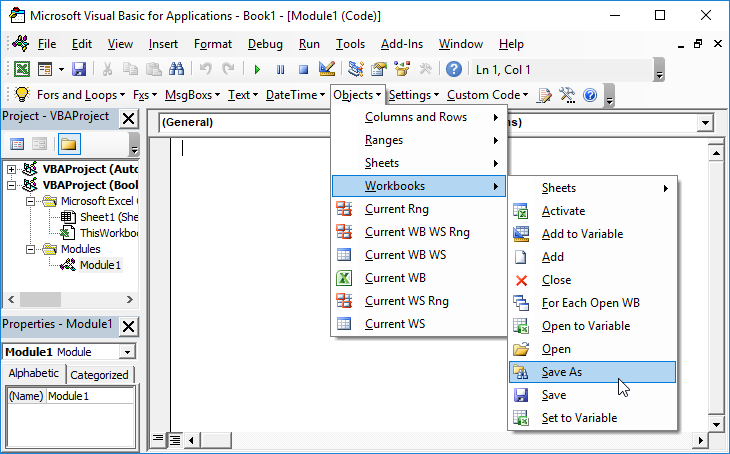
VBA Code Examples Add-in
Easily access all of the code examples found on our site.
Simply navigate to the menu, click, and the code will be inserted directly into your module. .xlam add-in.
Источник
Calculate Method of Worksheet Object VBA
VBA Reference
Effortlessly
Manage Your Projects
120+ Project Management Templates
Seamlessly manage your projects with our powerful & multi-purpose templates for project management.
120+ PM Templates Includes:
50+ Excel Templates
50+ PowerPoint Templates
25+ Word Templates
A Powerful & Multi-purpose Templates for project management. Now seamlessly manage your projects, tasks, meetings, presentations, teams, customers, stakeholders and time. This page describes all the amazing new features and options that come with our premium templates.
Save Up to 85% LIMITED TIME OFFER
All-in-One Pack
120+ Project Management Templates
Essential Pack
50+ Project Management Templates
Excel Pack
50+ Excel PM Templates
PowerPoint Pack
50+ Excel PM Templates
MS Word Pack
25+ Word PM Templates
Ultimate Project Management Template
Ultimate Resource Management Template
Project Portfolio Management Templates
Calculate Worksheet Method in VBA is used to calculate all open workbooks or a specific worksheet in a workbook or a specified range in a worksheet.
Why we use Calculate Worksheet Method in VBA?
If a workbook or a worksheet or a specific range has formulas we need to refresh each time when the values are changing. In that time we can use Calculate Worksheet Method in VBA.
VBA Calculate Worksheet Method- Syntax
Here is the example syntax to Calculate Worksheet method in Excel VBA.
Where Worksheet represents the object and Calculate is the method of worksheet object.
VBA Calculate Worksheet Method: All Open Workbooks
Please see the below VBA code to Calculate all open Workbooks. In this example we are using calculate method of application object.
VBA Calculate Worksheet Method: In Specific Sheet
Please see the below VBA code to Calculate in specified Worksheet named “Sheet1”.
VBA Calculate Worksheet Method: In Specified Range
Please see the below VBA code to Calculate in specified range (“A1:E10”) in a specified worksheet named “Sheet1”.
VBA Calculate Worksheet Method: Instructions
Please follow the below step by step instructions to execute the above mentioned VBA macros or codes:
- Open an Excel Worksheet
- Press Alt+F11 to Open VBA Editor
- Insert a Module from Insert Menu
- Copy the above code for activating worksheet and Paste in the code window(VBA Editor)
- Save the file as macro enabled Worksheet
- Press ‘F5’ to run it or Keep Pressing ‘F8’ to debug the code line by line and observe the calculations in the Worksheet.
Источник
VBA Range Calculate — Explained with Examples
VBA Reference
Effortlessly
Manage Your Projects
120+ Project Management Templates
Seamlessly manage your projects with our powerful & multi-purpose templates for project management.
120+ PM Templates Includes:
50+ Excel Templates
50+ PowerPoint Templates
25+ Word Templates
A Powerful & Multi-purpose Templates for project management. Now seamlessly manage your projects, tasks, meetings, presentations, teams, customers, stakeholders and time. This page describes all the amazing new features and options that come with our premium templates.
Save Up to 85% LIMITED TIME OFFER
All-in-One Pack
120+ Project Management Templates
Essential Pack
50+ Project Management Templates
Excel Pack
50+ Excel PM Templates
PowerPoint Pack
50+ Excel PM Templates
MS Word Pack
25+ Word PM Templates
Ultimate Project Management Template
Ultimate Resource Management Template
Project Portfolio Management Templates
We calculate the particular range using VBA. Calculate method in Excel help us to calculate all opened workbooks, specific workbooks, specific worksheets, Ranges, columns or rows. This method will be useful when your Excel Calculation method is set to manual mode. or if you have many formulas in the workbook and want to refresh or recalculate a particular range you can use Range.Calculate method.
VBA Range Calculate – Syntax
You can use the calculate method of the range to calculate any range.
VBA Range Calculate – Examples
Here is the simple example to calculate a specific Range. This example will calculate Range “A2:D10” using VBA.
VBA Range Calculate – Instructions
Please follow the below step by step instructions to execute the above mentioned VBA macros or codes:
- Open an Excel Workbook from your start menu or type Excel in your run command
- Enter some formula at B2 as “=D2” and enter some value at D2. Now you can see the D2 value at B2.
- Set the caluclation mode to manual to test this macro
- Change the value at D2, now you can see that B2 value is not change even you have made changes at D2
- Press Alt+F11 to Open VBA Editor or you can goto Developer Table from Excel Ribbon and click on the Visual Basic Command to launch the VBA Editor
- Insert a Module from Insert Menu of VBA
- Copy the above code (for Calculating a Range using VBA) and Paste in the code window(VBA Editor)
- Save the file as Macro Enabled Workbook (i.e; .xlsm file format)
- Press ‘F5′ to run it or Keep Pressing ‘F8′ to debug the code line by line.
Now you can observe that the value at B2 is changed as per D2.
Calculate the Columns using VBA
Here is the simple example to calculate a specific Columns. This example will calculate the columns “A to D” using VBA.
Calculate the Rows using VBA
Here is the simple example to calculate a specific rows using VBA. This example will calculate the Rows”1 to 20″ using VBA.
Источник
VBA, Calculation for multiple worksheets/workbook
I have the following Macro:
How can I apply this across multiple worksheets in a workbook? Or multiple workbooks with multiple worksheets? I have a macro to open all Excel files in my directory. Even better if I could bypass opening all Excel files.
Pretty much want to automate this macro within a large amount of files/sheets.
1 Answer 1
You can’t calculate without opening all the workbooks, but there is a simple command for what you are looking for: Application.CalculateFull . It re-calculates all sheets in all open workbooks. Be aware that this may take a long time and may make Excel seem like it is not responding until it finishes. In addition, if the open sheets are in a different instance of Excel from your macro above, they will not calculate.
So I would imagine your process to look like this:
- Run your macro to open all the files
- Run your macro above, with .CalculateFull just after .Calculation = xlCalculationAutomatic and just before End With , End Sub
Hot Network Questions
To subscribe to this RSS feed, copy and paste this URL into your RSS reader.
Site design / logo © 2023 Stack Exchange Inc; user contributions licensed under CC BY-SA . rev 2023.3.20.43331
By clicking “Accept all cookies”, you agree Stack Exchange can store cookies on your device and disclose information in accordance with our Cookie Policy.
Источник
Calculate Method of Application Object VBA
VBA Reference
Effortlessly
Manage Your Projects
120+ Project Management Templates
Seamlessly manage your projects with our powerful & multi-purpose templates for project management.
120+ PM Templates Includes:
50+ Excel Templates
50+ PowerPoint Templates
25+ Word Templates
A Powerful & Multi-purpose Templates for project management. Now seamlessly manage your projects, tasks, meetings, presentations, teams, customers, stakeholders and time. This page describes all the amazing new features and options that come with our premium templates.
Save Up to 85% LIMITED TIME OFFER
All-in-One Pack
120+ Project Management Templates
Essential Pack
50+ Project Management Templates
Excel Pack
50+ Excel PM Templates
PowerPoint Pack
50+ Excel PM Templates
MS Word Pack
25+ Word PM Templates
Ultimate Project Management Template
Ultimate Resource Management Template
Project Portfolio Management Templates
Calculate Application Method in VBA is used to calculate the all open Workbooks or a specific Worksheet or a specified range on a worksheet. Please find the syntax and examples of Calculate Application Method in VBA.
VBA Calculate Application Method – Syntax
Here is the syntax for the Calculate method of application object in VBA.
In the above syntax Application represents object and Calculate is the method of Application object.
VBA Calculate Application Method: Example 1
Please find the below example for calculate method of application object in excel VBA.
‘The below macro is used to calculates in all open workbooks
VBA Calculate Application Method: Example 2
Please find the below example for calculate method of application object in excel VBA.
‘The below macro is used to calculates in a specific Worksheet
VBA Calculate Application Method: Example 3
Please find the below example for calculate method of application object in excel VBA.
‘The below macro is used to calculates in a specified range
The example is used to calculate the formulas in column A, B, …, and E in the Worksheet names Sheet1.
VBA Calculate Application Method – Instructions
Please follow the below steps to execute the VBA code to save the excel file.
Step 1: Open any existing Excel Application.
Step 2: Press Alt+F11 – This will open the VBA Editor or Open it from Developer Tab..
Step 3: Insert a code module from then insert menu.
Step 4: Copy the above code and paste in the code module which have inserted in the above step.
Step 5: Calculate any Application.
Step 6: Now press F5 to execute the code and check the calculations in the Worksheet.
Источник
VBA Range Calculate — Explained with Examples
We calculate the particular range using VBA. Calculate method in Excel help us to calculate all opened workbooks, specific workbooks, specific worksheets, Ranges, columns or rows. This method will be useful when your Excel Calculation method is set to manual mode. or if you have many formulas in the workbook and want to refresh or recalculate a particular range you can use Range.Calculate method.
VBA Range Calculate – Syntax
You can use the calculate method of the range to calculate any range.
Range(“YourRange”).Calculate
VBA Range Calculate – Examples
Here is the simple example to calculate a specific Range. This example will calculate Range “A2:D10” using VBA.
Sub VBA_Calculate_Range()
Range("A2:D10").Calculate
End Sub
VBA Range Calculate – Instructions
Please follow the below step by step instructions to execute the above mentioned VBA macros or codes:
- Open an Excel Workbook from your start menu or type Excel in your run command
- Enter some formula at B2 as “=D2” and enter some value at D2. Now you can see the D2 value at B2.
- Set the caluclation mode to manual to test this macro
- Change the value at D2, now you can see that B2 value is not change even you have made changes at D2
- Press Alt+F11 to Open VBA Editor or you can goto Developer Table from Excel Ribbon and click on the Visual Basic Command to launch the VBA Editor
- Insert a Module from Insert Menu of VBA
- Copy the above code (for Calculating a Range using VBA) and Paste in the code window(VBA Editor)
- Save the file as Macro Enabled Workbook (i.e; .xlsm file format)
- Press ‘F5′ to run it or Keep Pressing ‘F8′ to debug the code line by line.
Now you can observe that the value at B2 is changed as per D2.
Calculate the Columns using VBA
Here is the simple example to calculate a specific Columns. This example will calculate the columns “A to D” using VBA.
Sub VBA_Calculate_Columns()
Columns("A:D").Calculate
'Or Range("A:D").Calculate
End Sub
Calculate the Rows using VBA
Here is the simple example to calculate a specific rows using VBA. This example will calculate the Rows”1 to 20″ using VBA.
Sub VBA_Calculate_Rows()
Rows("1:20").Calculate
End Sub
A Powerful & Multi-purpose Templates for project management. Now seamlessly manage your projects, tasks, meetings, presentations, teams, customers, stakeholders and time. This page describes all the amazing new features and options that come with our premium templates.
Save Up to 85% LIMITED TIME OFFER

All-in-One Pack
120+ Project Management Templates
Essential Pack
50+ Project Management Templates
Excel Pack
50+ Excel PM Templates
PowerPoint Pack
50+ Excel PM Templates
MS Word Pack
25+ Word PM Templates
Ultimate Project Management Template
Ultimate Resource Management Template
Project Portfolio Management Templates
- VBA Range Calculate – Syntax
- VBA Range Calculate – Examples
- VBA Range Calculate – Instructions
- Calculate the Columns using VBA
- Calculate the Rows using VBA
VBA Reference
Effortlessly
Manage Your Projects
120+ Project Management Templates
Seamlessly manage your projects with our powerful & multi-purpose templates for project management.
120+ PM Templates Includes:
Effectively Manage Your
Projects and Resources
ANALYSISTABS.COM provides free and premium project management tools, templates and dashboards for effectively managing the projects and analyzing the data.
We’re a crew of professionals expertise in Excel VBA, Business Analysis, Project Management. We’re Sharing our map to Project success with innovative tools, templates, tutorials and tips.
Project Management
Excel VBA
Download Free Excel 2007, 2010, 2013 Add-in for Creating Innovative Dashboards, Tools for Data Mining, Analysis, Visualization. Learn VBA for MS Excel, Word, PowerPoint, Access, Outlook to develop applications for retail, insurance, banking, finance, telecom, healthcare domains.
Page load link

3 Realtime VBA Projects
with Source Code!
Go to Top

